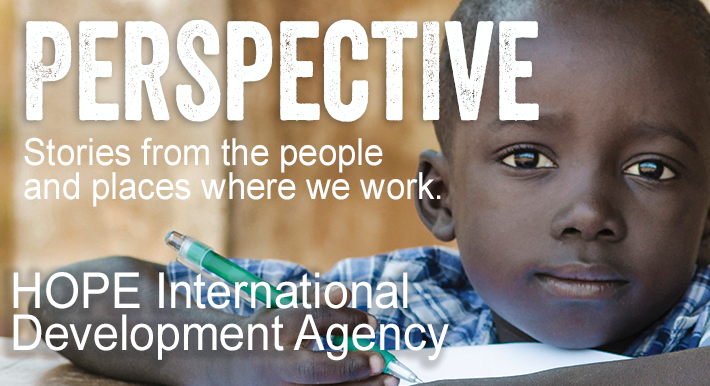In an earlier post, we talked about “hidden hunger” and the devastating impact it has on more than 2 billion people worldwide.
Today we look at the role local knowledge, passed down through many generations, can play in reducing malnutrition and the importance of not being too quick to replace local knowledge with new knowledge in some cases.
In 40 years of working with the world’s poorest people and their communities, we’ve learned that the best approach is to look for opportunities to partner local knowledge with new knowledge in the effort to eliminate hunger.
One example of the power of local knowledge is the Enset plant, or "false banana" as it’s known among communities in Bonke, southern Ethiopia.
The Enset plant been around as long as anyone can remember. In fact, it’s mentioned as far back as 1640, when a Portuguese priest called Enset the “tree against hunger” because of its drought resilience and long shelf life.
This odd looking plant (shown in the photo above) can survive lengthy periods of drought, protect the soil from erosion during heavy rains and floods, and once processed, it can be stored, underground for at least 1-year without decaying. To those without the benefit of local knowledge the Enset plant looks like a banana plant without the bananas. The stalk of the plant is the food and is a staple in the diet of most families in Bonke. The presence of the Enset plant is not by chance either. Families have been cultivating it for generations, and as a result, it’s abundant throughout the Bonke region.
Agricultural specialists recently studied the nutritional value of Enset plant and found that pregnant women with Enset-based diets have higher levels of vitamin B-12 and zinc, both of which protect against certain pregnancy complications, than women who have corn-based diets.
An Enset-based diet is obviously not a total solution to the nutritional deficiencies that families face in Bonke, but it is an important reminder that helping families reduce hunger and malnutrition requires listening to their ideas and building on their knowledge.
Families in Bonke might not know what vitamin B-12 and zinc are and the important role they play in keeping pregnant women and their yet-to-be-born children healthy, but generation after generation have passed down the knowledge of the Enset plant and benefited from its nutritional value.
HOPE International Development Agency approaches families and communities with respect and openness to “new to us” ideas - ideas that have shown their value in reducing poverty.
In this case, it’s about the merits of the Enset plant, or "false banana". A plant that seemingly bears no fruit, but in reality is an important food and nutrient source to families in Bonke.
So, while we provide nutritional education and encourage families to diversify their diet by adding backyard gardens full of fruits and vegetables, we are always sure not to discount the local indigenous knowledge of the families and communities that we partner with in an effort to free people from poverty, and in this case, hunger and malnutrition.
Today we look at the role local knowledge, passed down through many generations, can play in reducing malnutrition and the importance of not being too quick to replace local knowledge with new knowledge in some cases.
In 40 years of working with the world’s poorest people and their communities, we’ve learned that the best approach is to look for opportunities to partner local knowledge with new knowledge in the effort to eliminate hunger.
One example of the power of local knowledge is the Enset plant, or "false banana" as it’s known among communities in Bonke, southern Ethiopia.
The Enset plant been around as long as anyone can remember. In fact, it’s mentioned as far back as 1640, when a Portuguese priest called Enset the “tree against hunger” because of its drought resilience and long shelf life.
This odd looking plant (shown in the photo above) can survive lengthy periods of drought, protect the soil from erosion during heavy rains and floods, and once processed, it can be stored, underground for at least 1-year without decaying. To those without the benefit of local knowledge the Enset plant looks like a banana plant without the bananas. The stalk of the plant is the food and is a staple in the diet of most families in Bonke. The presence of the Enset plant is not by chance either. Families have been cultivating it for generations, and as a result, it’s abundant throughout the Bonke region.
Agricultural specialists recently studied the nutritional value of Enset plant and found that pregnant women with Enset-based diets have higher levels of vitamin B-12 and zinc, both of which protect against certain pregnancy complications, than women who have corn-based diets.
An Enset-based diet is obviously not a total solution to the nutritional deficiencies that families face in Bonke, but it is an important reminder that helping families reduce hunger and malnutrition requires listening to their ideas and building on their knowledge.
Families in Bonke might not know what vitamin B-12 and zinc are and the important role they play in keeping pregnant women and their yet-to-be-born children healthy, but generation after generation have passed down the knowledge of the Enset plant and benefited from its nutritional value.
HOPE International Development Agency approaches families and communities with respect and openness to “new to us” ideas - ideas that have shown their value in reducing poverty.
In this case, it’s about the merits of the Enset plant, or "false banana". A plant that seemingly bears no fruit, but in reality is an important food and nutrient source to families in Bonke.
So, while we provide nutritional education and encourage families to diversify their diet by adding backyard gardens full of fruits and vegetables, we are always sure not to discount the local indigenous knowledge of the families and communities that we partner with in an effort to free people from poverty, and in this case, hunger and malnutrition.


